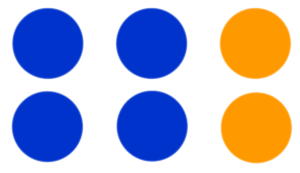Αντιμεταθετική ιδιότητα
Σύμφωνα με τον ορισμό της αντιμεταθετικής ιδιότητας όταν προσθέτουμε ή πολλαπλασιάζουμε δύο αριθμούς το αποτέλεσμα των πράξεων παραμένει το ίδιο, ακόμα κι αν αλλάξουμε τη θέση των δύο αριθμών (δηλαδή τους αντιμεταθέσουμε).
Αυτό σημαίνει ότι όταν προσθέτουμε ή πολλαπλασιάζουμε, μπορούμε να αλλάζουμε τη θέση των αριθμών και το αποτέλεσμα να παραμένει το ίδιο.
Παραδείγματα:
Addition |
Multiplication |
| a + b = b + a | a * b = b * a or ab =ba |
 |
 |
|
4 + 2 = 2 + 4 4 + 2 = 6 and 2 + 4 = 6 |
4 * 2 = 2 * 4 4 * 2 = 8 and 2 * 4 = 8 |
Prashanthi Rao , LicenseCC-BY-SA, GeoGebra Terms of Use
Linda Fahlberg-Stojanovska, LicenseCC-BY-SA, GeoGebra Terms of Use
Linda Fahlberg-Stojanovska , LicenseCC-BY-SA, GeoGebra Terms of Use
